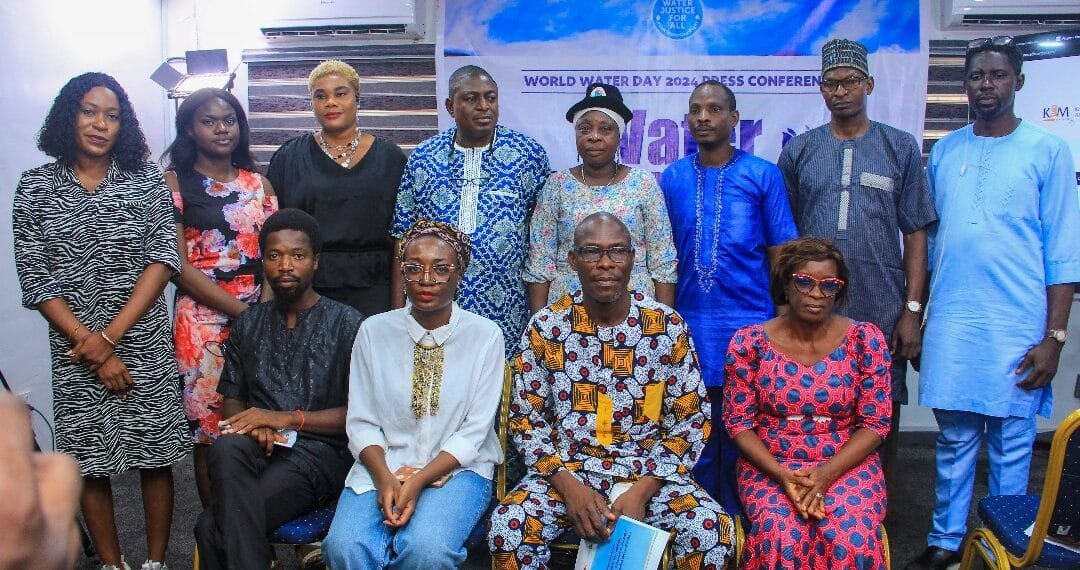Rights activists and labour groups under the auspices of the Our Water Our Right Africa Coalition (OWORAC) have urged governments of African countries, the Federal Government, Lagos State and the 36 state governments across the country to discard all ongoing and future plans to privatize water services in Nigeria.
They described the failure of government at the national and sub-national levels and especially Lagos State that prides itself as the Centre of Excellence to provide clean, potable and affordable water in their domains as ‘a shame of monumental proportions,’ insisting that government’s neglect of the water sector was unacceptable.
This was the verdict of stakeholders and advocates of public water sector who converged on Lagos for a press conference on the sidelines of this year’s World Water Day (WWD) with the theme: Water for Peace, which they maintained, underscores the critical necessity of water for human survival and societal stability in Nigeria and Africa.
In his presentation titled: Public Control of Water Promotes Community Peace, Executive Director of Corporate Accountability and Public Participation Africa (CAPPA), Akinbode Oluwafemi, lamented that over 400 million Africans still lack safe drinking water, while in Nigeria, a staggering 113 million people suffer from painful hardship and crippling deprivation of water, which is a basic human right.
 “This saddening neglect is not due to scarcity of resources, but rather a consequence of the profit driven logic adopted by the state authorities in managing water supply and amenities. The relentless pursuit of commodifying public resources at the expense of the people’s welfare, has led to the deterioration of vital public utilities and social services,” he said.
“This saddening neglect is not due to scarcity of resources, but rather a consequence of the profit driven logic adopted by the state authorities in managing water supply and amenities. The relentless pursuit of commodifying public resources at the expense of the people’s welfare, has led to the deterioration of vital public utilities and social services,” he said.
Citing the failure of water privatizing financing models in the United States of America (USA), Chile, France, Tanzania, Ghana and Gabon, among others, he insisted that Public-Private Partnerships (PPPs) offer no real solutions to water challenges globally.
He, therefore, recommended increased budgetary allocation to revive the performance of the water sector, refurbish dilapidated infrastructure, upgrade existing waterworks and build new facilities to ensure widespread access to clean and safe drinking water.
Oluwafemi also charged the Lagos Water Corporation to fulfill its responsibility of public water distribution across the state and not just economically viable neighbourhoods.
Read also: The Evolution of Healthcare Service in Nigeria
Other recommendations include strengthening regulatory oversight and implementing proper reparation mechanisms in local communities affected by water injustices like contamination, scarcity and inaccessibility, adding: “These mechanisms should include measures by state ministries to address the consequences of prolonged exposure to contaminated water, especially for women and girls.
“Government should support and protect water sector workers by reversing layoff plans, enhance water infrastructure conditions and ensure adequate wages along with comprehensive training programmes to improve their skills and performance. It should also foster a participatory approach to water governance that prioritizes the voices and needs of local communities into decision-making processes related to water management.”
Other speakers at the media briefing include Comrade Ahmed Gbemisola and other representatives of the Amalgamated Union of Public Corporations, Civil Service Technical and Recreational Services Employees (AUPCTRE); Convener Water Citizens Network, Ghana, Geoffrey Kabutey Ocansey; Oumar Ba of SATES, Senegal; Sandra Ndang of the African Centre for Advocacy (ACA), Cameroun, and a representative of Iludun Community in Agege Council of Lagos State, Pastor Felix Ikupolosi, among others.
Ndang said: “Water is more than a commodity. It is the foundation for peace, health and sustainable development in Africa. We urge decision makers to prioritize investments in public water infrastructure and empower communities to be stewards of their water resources. Only then can we achieve Water for Peace-a theme that requires both access and community ownership.”
On his part Ocansey said: “Whether ingested or applied to the skin, the peace water presents to the heart and skin is priceless. Let peace reach all humans across the globe.”
Oumar Ba stated: “Access to safe drinking water is an essential component of sustainable peace in the world. Everyone must work to preserve the quality of water resources and make them affordable and accessible to all communities, especially disadvantaged ones.”
Anabela Lemos, who spoke on behalf of Justica Ambiental, Friends of the Earth Mozambique, said: “It is regrettable that governments and financial institutions promote exclusion through investments that result in the privatization of water and that disadvantage the poor from fundamental right to life. We call on governments of Africa to abandon the incentive of privatization that increases inequality and exacerbates social tensions on the continent.”
CAPTION FOR WORLD WATER DAY PICTURES
PIX 1:
Participants during the press conference to commemorate World Water Day at Corporate Accountability and Public Participation Africa (CAPPA) office in Lagos…at the weekend.
PIX 2
Policy and Research Officer of CAPPA, Zikora Ibeh; Executive Director of CAPPA, Akinbode Oluwafemi and a representative of AUPCTRE, Comrade Ahmed Gbemisola at the media briefing on World Water Day in Lagos on Friday.






